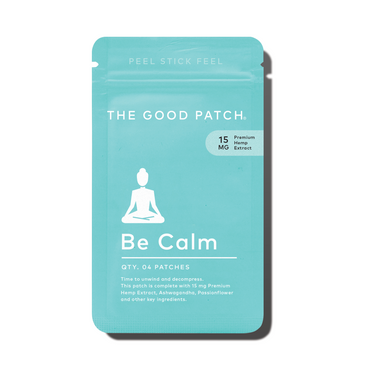Life is a constant balancing act of relationships. We are constantly tending to our connection with family members, friends, colleagues, and romantic partners. Amidst our daily interaction, many of us forget about the importance of maintaining a healthy relationship with ourselves.
Let’s dive into self-love, ways to practice self-love, and why it is an essential part of a happy and healthy life.
What Is Self-Love?
At The Good Patch, we know the term “self-love” gets tossed around a lot. Sometimes it can be hard to sort out how to make it a consistent part of your life.
Though a new skincare routine or a calming scented candle can be great, some intangible self-love aspects are just as important. Defining the practice is difficult because it varies from person to person, but self-love generally means prioritizing your own happiness and well-being.
Self-love is not a form of selfishness or narcissism but rather a healthy habit pattern that focuses on your needs! We’ll get into why self-love is, in many ways, a selfless practice.
Four broader aspects of self-love include:
- Self-awareness
- Self-worth
- Self-esteem
- Self-care
Of course, this is all easier said than done, and more likely than not, you’re reading this article for a bit of support on how to love yourself. Luckily, we are here to give you just that!
What Are the Benefits of Self-Love?
Practicing self-love has a whole bunch of benefits, all of which lead to higher self-esteem and personal growth. Learning to acknowledge the worth of loving yourself is exceedingly important to reap the benefits, so let’s get into it.
How Self-Love Benefits Mental Health
Each day is a chance to infuse positive energy into your life, which can begin by pruning back the parts that bring you down. Understanding which relationships and responsibilities do more to drain you than lift you up is vital.
By treating yourself better, you will find that you are naturally drawn to activities that give you validation rather than ones that suck the fun out of life. Beyond the happiness brought on by self-love, it will bleed into many other parts of your life.
Don’t get us wrong, self-love is meant to benefit your relationship with yourself, but there’s no reason to complain when it improves how you connect with others. Practicing self-love will bring you to a new level of mental balance that lends you more self-acceptance, self-compassion, and increased compassion toward the loved ones around you.
When you learn to check in with yourself consistently, you gain the empathy for yourself necessary for showing empathy to others. By taking part in daily acts of self-love, you will notice a new layer of emotional resilience for everything life might send your way.
How Self-Love Benefits Physical Health
In addition to improving your mental health, self-love creates a positive feedback loop for your physical health. Working more physical activity into your routine is shown to improve:
- Brain health (sharpens judgment, learning, and critical thinking)
- Weight management
- Overall fitness
When you feel good, you can’t help but want to stay active, and it’s only up from there! Our Rest & Recover Duo is the perfect remedy after a long day or tough workout to boost your physical self-love routine.
How Can I Practice Self-Love?
Remember, Nobody Is Perfect!
Beginning to practice self-love means dropping perfectionism and readying yourself to make mistakes once in a while (or all the time). Deciding which forms of self-love are right for you means spending time getting it wrong first.
Silencing our inner critic can be difficult, but building up the self-respect and patience required to let yourself make a mistake or two is in and of itself a strong form of self-love. Even the apparently idyllic lives of the social media personalities that constantly flow through your phone aren’t perfect.
Take a break from comparisons and self-criticism, and get comfortable with the fact that it is okay to misstep on your journey.
Be Grateful on Purpose
Gratitude is one of the most frequently preached aspects of self-love, and it works wonders. Upping your daily dose of self-awareness and taking a moment to think of the things you have to be grateful for is a way to fend off the stress brought on by thinking of the past and future.
Keeping a gratitude journal is a popular trend to help track all the amazing parts of life. If journaling isn’t for you, there are ways to interact with all for which you’re thankful. Even a tranquil moment taken at the end of the day to reflect can be enough!
Here are a few more concrete ideas to kick off your path of gratitude:
-
Notice the changes — List, on paper or in your head, parts of your life that have gone from bad to great, and realize how far you’ve come!
-
Get spiritual — Many religious and spiritual traditions include powerful prayers of gratitude.
- Fake it ‘til you make it — Sometimes we just aren’t in the mood, but summoning the energy to smile and say “thank you” can prompt the feelings of gratitude we lack at times.
Showing gratitude will improve not only your mindset but also your mood and emotional state.
Embark on a Mindfulness Mission
On the surface, being mindful can appear to be a vague exercise our overly-spiritual friends won’t quit talking about. However, intentionally drawing awareness towards yourself and your environment is a superb way to practice self-love.
Mindfulness means setting free judgment of yourself and your thoughts to understand your needs and desires. A popular form of mindfulness you just might have heard of is meditation.
If you are someone who needs a structured day, meditation is a great option for you. Carve out a few minutes every day to relax your mind and get in touch with yourself more deeply.
Do you find it tricky to chill out sometimes? Check out our Ultimate Zen Duo for a little help unwinding.
Talk to Yourself Like a Loved One
Positive self-talk is absolutely essential for grasping the task of self-love. Be conscious and considerate with how you talk to yourself, showing yourself the same compassion you would a loved one. You wouldn’t kick your family and friends when they’re down, so why do it to yourself?
Positive self-talk means changing how we view many of life’s common occurrences. Instead of lamenting a failure, be proud that you made an effort to try. Rather than avoiding tasks you don’t know how to do, see each one as an opportunity to learn and improve.
When the voice in your head begins to get negative, remind yourself of the very first tip — nobody is perfect! Rather than beating yourself up when something goes wrong, recognize why you didn’t achieve your goal and strategize how you will do it right next time.
Wrapping It Up
As we’ve discussed, self-love is a journey, and we’re all at different points along the way. For some of us, loving ourselves comes naturally, and this article has served as extra support for continuing this important practice. Others need a little more help, and that is totally okay.
If you struggle to find the motivation needed to jumpstart feeding your relationship with yourself, remember there’s nothing wrong with faking it until you make it. Maybe you need a little bigger push to get your daily self-love on.
Our Daily Ritual Set can help you make the msot of each day. Self-love doesn’t come naturally to all of us, but embracing the effort makes it all the more satisfying when it turns from a chore to a reflex.
Sources:
Self-Love and What It Means | Brain & Behavior Research Foundation







